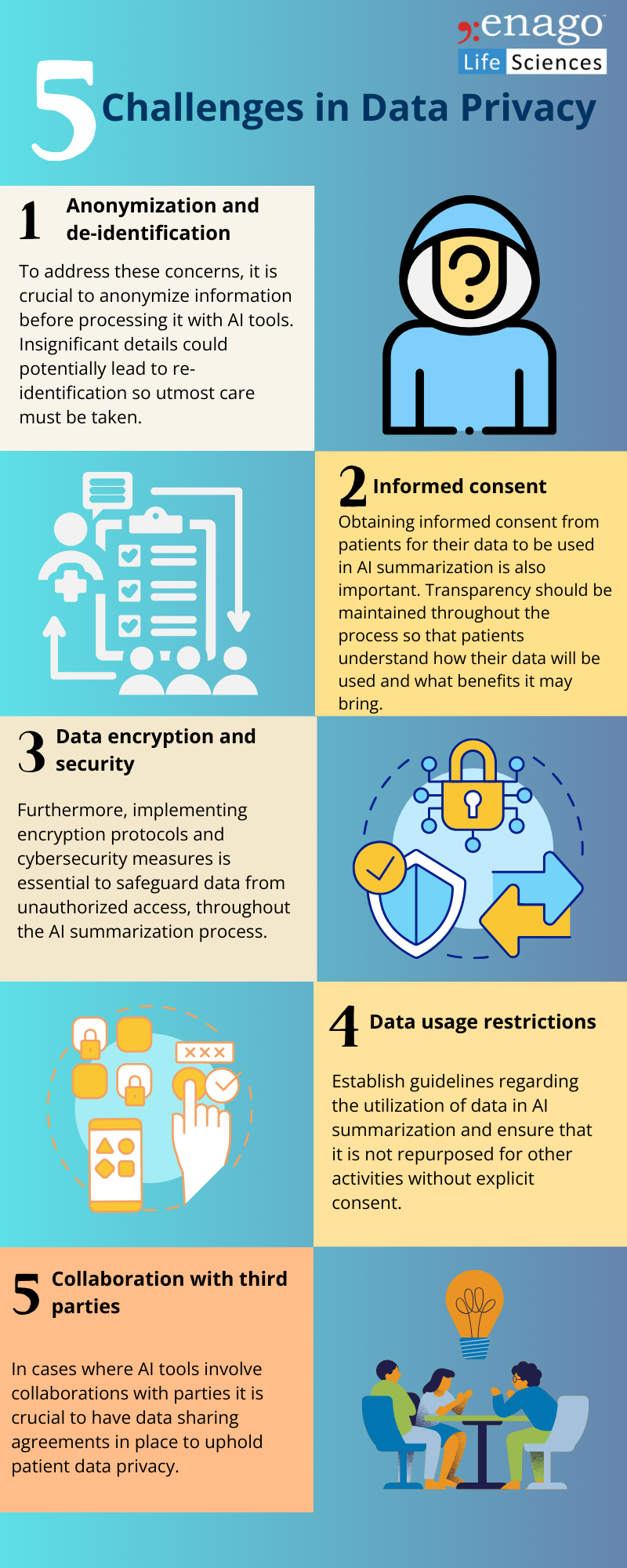The PLS Series: Balancing Progress and Privacy—The Ethical Implications of Using AI for Developing Plain Language Summaries
In today’s paced world of information sharing, it has become increasingly crucial to create content that’s clear, concise, and easily understandable. A Plain Language Summary (PLS; also referred to as a lay summary in some subject areas) communicates the significance of scholarly and scientific research evidence to wide audiences in clear, jargon-free language. The audiences include, but are not limited to, practitioners, policy makers, the public, and/or professionals in nearby disciplines.
PLS is a concept that is long known in science communication, and especially medical publications, and plays an important role in making complex information more accessible to an audience. There are largely two types of PLS: clinical trial summaries and research paper summaries. We aim to focus on the first type pf PLS for the purpose of this article.
We all know the improving capabilities of AI tools and this is why we think they can come into play revolutionizing the way PLS is developed. However, before we embrace the power of AI in simplifying content, we must also address the issue of safeguarding patient data and ensuring privacy from a clinical trial point of view. In this opinion piece, we will explore the advantages of using AI-driven PLS and delve into the area concerning data protection.
Studies have demonstrated that using PLS improves comprehension and knowledge acquisition among non-experts compared to abstracts. In the field of psychology for instance individuals were found to understand information when presented with PLS, which were also perceived as credible. Similarly, when it comes to trials, participants expressed a desire to receive PLS detailing trial results.
AI has made advancements in natural language processing empowering tools to transform texts into easily digestible PLS. These tools carefully analyze the context, structure and meaning of content to extract points and present them in a reader-friendly manner.
Advantages of PLS Generated by AI
- Efficiency: AI tools have the ability to quickly process amounts of information enabling them to generate summaries much faster than humans can.
- Consistency: One advantage of using AI tools, for summarization, is that they ensure consistency in style and tone throughout the summary. This eliminates any discrepancies that may arise from summarization.
- Accessibility: Another benefit is that AI-generated PLS makes critical information more accessible to people with varying levels of expertise.
- Language diversity: These tools can also provide summaries in languages allowing a global audience to access the information.
However, when implementing AI tools in areas like healthcare, ethical considerations regarding patient data privacy and data protection are utmost crucial.

The integration of AI into medical communications presents a promising avenue for healthcare advancement. From the perspective of AI ethics, this development raises both opportunities and challenges that require careful consideration. On the positive side, AI can significantly enhance medical communications by streamlining administrative tasks, improving data analysis, and facilitating timely patient-doctor interactions. This can ultimately lead to better patient care, reduced healthcare costs, and improved healthcare accessibility.
However, ethical concerns also loom large in the realm of AI-driven medical communications. The primary concern centers on privacy and data security. AI systems require access to extensive patient data, which can be sensitive and personal. It is crucial to ensure that robust security measures are in place to protect patient information from breaches and unauthorized access. Additionally, there must be stringent regulations and guidelines governing the use of AI in healthcare to prevent discrimination, bias, or misuse of patient data. Moreover, there’s the ethical dilemma of accountability. In cases where AI plays a significant role in medical communications, who is responsible for errors or malfunctions? Is it the AI system itself, the healthcare provider, or the technology company that developed it? Ensuring clear lines of responsibility and accountability is essential to maintain trust in the healthcare system.
In conclusion, AI has the potential to revolutionize medical communications, but it must be approached with a strong commitment to AI ethics. Privacy, data security, accountability, and transparency must be at the forefront of AI integration in healthcare. By addressing these ethical concerns, we can harness the benefits of AI while safeguarding patient well-being and trust in the medical profession.

Moving Forward — Balancing progress and ethics
As we continue to embrace the use of AI technology for generating summaries it becomes essential to strike a balance between innovative advancements and ethical responsibilities. By addressing the challenges associated with maintaining data privacy we can effectively leverage the power of AI tools to simplify complex information while upholding trust and confidentiality for those whose data is involved.
To conclude, integrating AI tools into the creation of PLS represents a leap that offers immense potential across various fields. However, given the nature of data privacy it is crucial to adopt a comprehensive and ethical approach that ensures progress aligns with values such as transparency, consent, and security. It is crucial to ensure that these summaries meet the literacy requirements of the intended audience and adhere to writing guidelines. Additionally, maintaining the confidentiality of data is of importance when utilizing AI tools to generate PLS. Further research and evaluation are necessary to address these challenges and optimize the utilization of AI tools, in producing PLS.
In our next thought leadership article on PLS, we will also delve into the accuracy of such AI tools in delivering a technically accurate output in a simple language. In the meanwhile, we would love to discuss this with like-minded medical communications and publications professionals and also love to know your experiences and viewpoints. Please contact us at services@ls.enago.com for further discussion on this topic.
Disclaimer: This article provides personal viewpoints along with some factual information and should not be considered as professional advice. For guidance on medical or scientific matters, it is recommended to consult relevant guidelines and experts in healthcare and medcomms.
Authors:
 Dr. Anupama Kapadia
Dr. Anupama Kapadia
General Manager, Enago Life Sciences
Connect with Anupama on LinkedIn
 Raghuraj Puthige, PhD.
Raghuraj Puthige, PhD.
Function Head, Medical Communications – Enago Life Sciences
Connect with Raghuraj on LinkedIn

